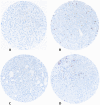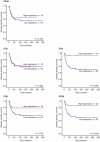Prognostic impact of lymphocytes in soft tissue sarcomas
- PMID: 21298041
- PMCID: PMC3029277
- DOI: 10.1371/journal.pone.0014611
Prognostic impact of lymphocytes in soft tissue sarcomas
Abstract
Purpose: The purpose of this study was to clarify the prognostic significance of lymphocyte infiltration in soft tissue sarcomas (STS). Prognostic markers in potentially curable STS should guide therapy after surgical resection. The immune status at the time of resection may be important, but the prognostic significance of tumor infiltrating lymphocytes is controversial as the immune system has conflicting roles during cancer development.
Experimental design: Tissue microarrays from 249 patients with STS were constructed from duplicate cores of viable and representative neoplastic tumor areas. Immunohistochemistry was used to evaluate the CD3+, CD4+, CD8+, CD20+ and CD45+ lymphocytes in tumors.
Results: In univariate analyses, increased numbers of CD4+ (P = 0.008) and CD20+ (P = 0.006) lymphocytes in tumor correlated significantly with an improved disease-specific survival (DSS) in patients with wide resection margins (n = 108). In patients with non-wide resection margins (n = 141) increased numbers of CD3+ (P = 0.028) lymphocytes in tumor correlated significantly with shorter DSS. In multivariate analyses, a high number of CD20+ lymphocytes (HR = 5.5, CI 95% = 1.6-18.6, P = 0.006) in the tumor was an independent positive prognostic factor for DSS in patients with wide resections margins.
Conclusions: High density of CD20+ lymphocytes in STS with wide resection margins is an independent positive prognostic indicator for these patients. Further research is needed to define if CD20+ cells can modify tumors in a way that reduces disease progression and metastatic potential.
Conflict of interest statement
Figures



References
-
- Gustafson P. Soft tissue sarcoma. Epidemiology and prognosis in 508 patients. Acta Orthop Scand Suppl. 1994;259:1–31. - PubMed
-
- Engellau J, Anderson H, Rydholm A, Bauer HC, Hall KS, et al. Time dependence of prognostic factors for patients with soft tissue sarcoma: a Scandinavian Sarcoma Group Study of 338 malignant fibrous histiocytomas. Cancer. 2004;100:2233–2239. - PubMed
-
- Dickinson IC, Whitwell DJ, Battistuta D, Thompson B, Strobel N, et al. Surgical margin and its influence on survival in soft tissue sarcoma. ANZ J Surg. 2006;76:104–109. - PubMed
-
- Kiatisevi P, Asavamongkolkul A, Phimolsarnti R, Waikakul S, Benjarassamerote S. The outcomes and prognostic factors of patients with soft-tissue sarcoma. J Med Assoc Thai. 2006;89:334–342. - PubMed
-
- Koea JB, Leung D, Lewis JJ, Brennan MF. Histopathologic type: an independent prognostic factor in primary soft tissue sarcoma of the extremity? Ann Surg Oncol. 2003;10:432–440. - PubMed
Publication types
MeSH terms
Substances
LinkOut - more resources
Full Text Sources
Medical
Research Materials
Miscellaneous

